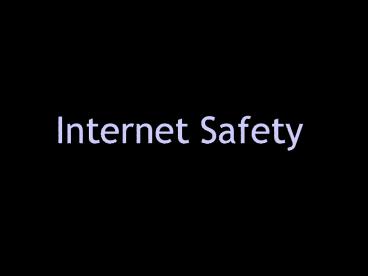Internet Safety - PowerPoint PPT Presentation
1 / 39
Title:
Internet Safety
Description:
Safety tips for parents *http://www.netsmartz.org/safety/safetytips.htm ... wiredsafety.org is the world's largest online safety and help group ... – PowerPoint PPT presentation
Number of Views:113
Avg rating:3.0/5.0
Title: Internet Safety
1
Internet Safety
2
Do you know what your kids are doing while they
are online?
3
(No Transcript)
4
Do you know who they are talking to?
5
IM
Chat
6
Soccer Girl Video
7
(No Transcript)
8
Finding Teresa video
9
Now do you want to know more?
10
Here are a few statistics provided by ISafe.org
11
34 of students say the main way they keep in
touch with friends is through e-mail, instant
messaging, or chat rooms
12
24 of students are online an average of more
than an hour everyday.
13
29 of students have given out personal
information (name, sex, age) over the Internet.
14
24 of students see nothing wrong with chatting
with strangers on the Internet.
15
37 of students trust those with whom they chat
online.
16
Yet28 of students have seen something on the
Internet that they consider dangerous.
17
25 of students say they have visited
inappropriate places online.
18
24 of students say if their parents knew where
they went or with whom they chatted on the
Internet, they would disapprove, restrict their
computer use, or take it away.
19
And82 of students say kids and teens need to
learn Internet safety.
20
So What is a parent to do?
21
Be actively involved
22
The
Makes these suggestions
http//www.fbi.gov/publications/pguide/pguidee.htm
23
What Can You Do To Minimize The Chances Of An
On-line Exploiter Victimizing Your Child?
- Communicate, and talk to your child about sexual
victimization and potential on-line danger. - Spend time with your children on-line. Have them
teach you about their favorite on-line
destinations. - Keep the computer in a common room in the house,
not in your child's bedroom. It is much more
difficult for a computer-sex offender to
communicate with a child when the computer screen
is visible to a parent or another member of the
household.
24
- Utilize parental controls provided by your
service provider and/or blocking software. Use of
chat rooms, in particular, should be heavily
monitored. While parents should utilize these
mechanisms, they should not totally rely on them. - Always maintain access to your child's on-line
account and randomly check his/her e-mail. Be
aware that your child could be contacted through
the U.S. Mail. Be up front with your child about
your access and reasons why. - Teach your child the responsible use of the
resources on-line. There is much more to the
on-line experience than chat rooms. - Find out what computer safeguards are utilized by
your child's school, the public library, and at
the homes of your child's friends. These are all
places, outside your normal supervision, where
your child could encounter an on-line predator. - Understand, even if your child was a willing
participant in any form of sexual exploitation,
that he/she is not at fault and is the victim.
The offender always bears the complete
responsibility for his or her actions.
25
- Instruct your children
- to never arrange a face-to-face meeting with
someone they met on- line - to never upload (post) pictures of themselves
onto the Internet or on-line service to people
they do not personally know - to never give out identifying information such as
their name, home address, school name, or
telephone number - to never download pictures from an unknown
source, as there is a good chance there could be
sexually explicit images - to never respond to messages or bulletin board
postings that are suggestive, obscene,
belligerent, or harassing - that whatever they are told on-line may or may
not be true.
26
Get your children actively involved.
27
www.netsmartzkids.org
28
www.netsmartzkids.org
29
Educate yourself
30
(No Transcript)
31
www.netsmartz.org
Blog Quiz
32
NetSmartz.org Resources
Real-life Video Lessons http//www.netsmartz.org/r
esources/reallife.htm Safety tips for parents
http//www.netsmartz.org/safety/safetytips.htm
Internet Safety Pledge - various
ages http//www.netsmartz.org/resources/pledge.ht
m
33
www.isafe.org
34
I hope some of the information presented here has
alerted you to the potential risks.
35
I hope you have also seen that quality help and
resources are available.
36
I challenge you to get involved!
37
An online version of this presentation and its
links/notes can be found by visiting the
Lexlt-gtConnect link RBE School Homepage
atwww.lexington1.net/rbe/rbehp.htm and then
clicking on the Internet Safety Link.
38
Bibliography
- http//www.netsmartz.org/
- http//www.isafe.org/
- http//www.fbi.gov/publications/pguide/pguidee.htm
39
Other Useful Resources
- ALA Especially for Young People and Their
Parents - It includes special sites for parents
and caregivers, suggested family Internet safety
guidelines, suggested rules and Netiquette for
children when using... www.ala.org/oif/youngpeople
/children/ - wiredsafety.org is the world's largest online
safety and help group































